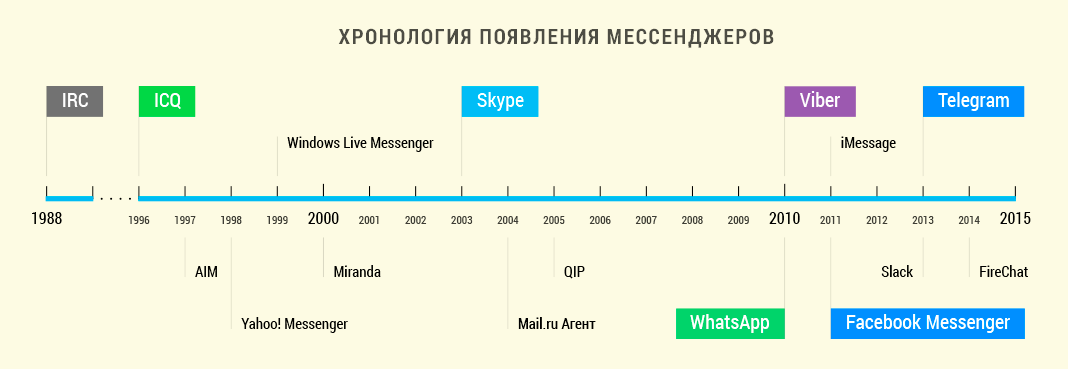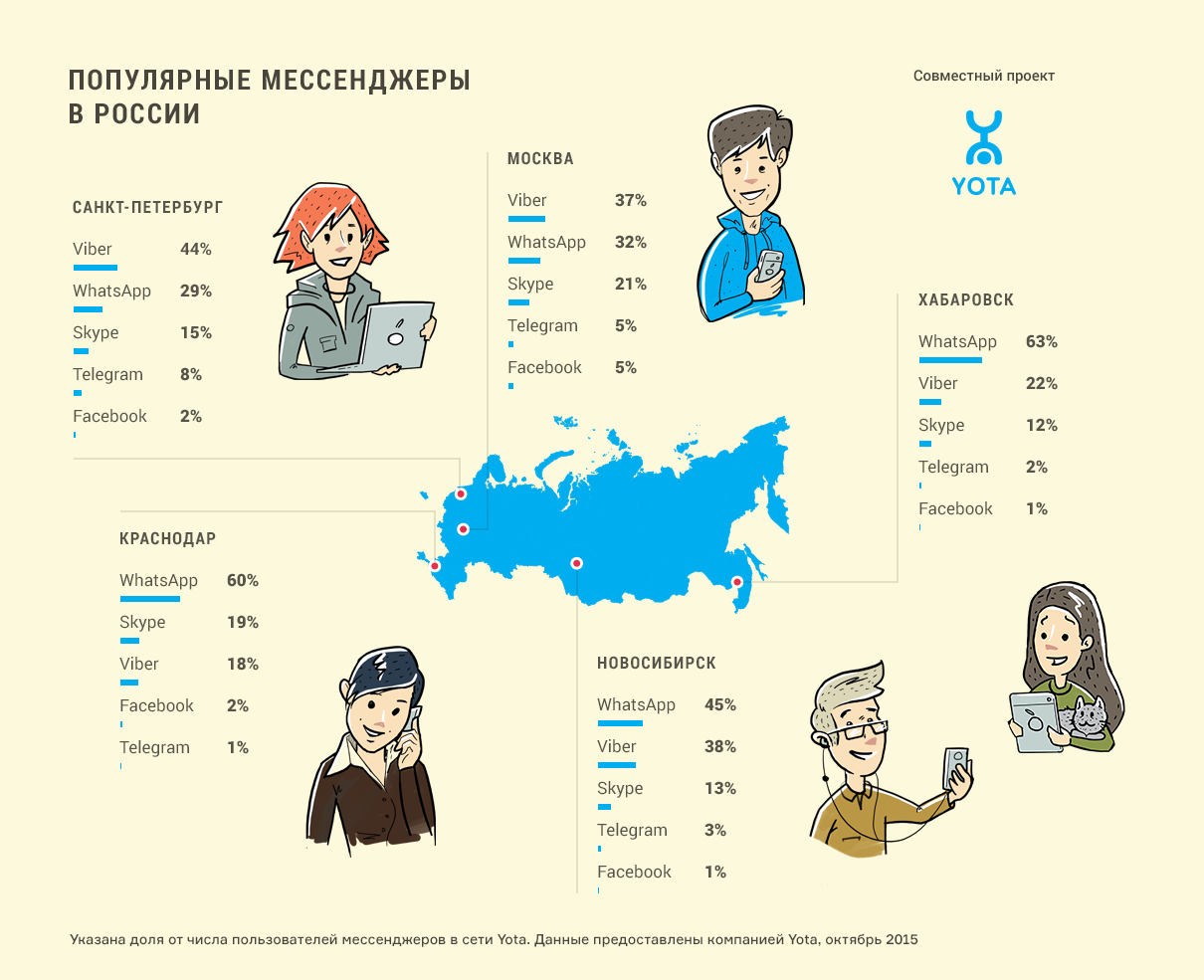How do residents of different cities communicate

Nowadays, it is rather difficult to imagine life without mobile Internet, its importance increases from year to year. But more recently, people quietly lived and talked, even without dreaming about something like that. We surf the sites every day, read news and articles, and most importantly, communicate with other people. And for this we are increasingly using mobile messengers. Today, their diversity is greater than ever, and there are more and more new applications. We are interested, is there any dependence in the preferences of instant messengers among residents of different cities? It turned out there. Read the details in our study with IOD .
History tour

The history of online messengers began in 1988, when Finnish developer Jarkko Oikarinen invented the Internet Relay Chat (IRC) protocol. It laid down the basic elements of modern chat: the ability to see users on the network, receive and send messages and files. And in 1996, the Internet was “blown up” by the Israeli company Mirabilis, releasing the first version of ICQ. In the late 1990s and early 2000s, exactly ICQ was the most popular messenger in Russia, none of the competitors could even come close to it. Do you remember how much money people paid for six-to-sevens? And today they can be cheaply bought from once proud owners, who have not used ICQ for many years.
')
But nevertheless, it is impossible not to recall other popular applications of the time - QIP, Miranda IM, Trillian, AIM, MSN Messenger (renamed later Windows Live Messenger), Agent (developed by Mail.Ru) and Yahoo Messenger. And with the release in 2004 of the Jimm application, capable of working on the ICQ protocol, the development of mobile messengers began.
With the development of mobile gadgets and cheaper Internet, users have become increasingly “change” on smartphones. In 2009, the era of WhatsApp, which today is the most popular messenger in the world. Its developers made a strategically correct decision - for the first time they tied a user account to a telephone number. As a result, the volume of SMS traffic began to fall at a catastrophic rate. In 2010, Viber was released, which focused primarily on voice communication.
Today, there are a huge number of messaging applications that are very similar to each other. The standard set of functions includes not only text messages, but also file transfer, audio and video calls. The differences are mainly in the interface and the way to create an account: with reference to a phone number, to a page on the social network or, on the contrary, you need to register an autonomous account.
Current situation
So, what are the most popular mobile messaging apps today?
ICQ and Mail.ru
We must pay tribute to the old woman "ICQ" - she is alive and growing, recently she turned 19 years old. Since 2010, ICQ has been owned by the Mail.Ru Group holding, which in parallel develops its Agent messenger. Both he and ICQ have a user-friendly interface and all the standard features of modern instant messengers.
Skype
This application entered the market in 2003. First of all, it was positioned as a service for voice communications. But popularity did not come to him immediately: calls via the Internet required a fairly wide channel, which few people could boast of in those years. Today, the Skype audience has more than 300 million people, and with its help, you can call any phones around the world.
Initially, it was created to track the status of contacts from the phone book. But soon the developers quickly added the function of sending text messages, and then photos, which immediately had to taste to millions of users. Today, WhatsApp allows you to send anything you want, including geo-coordinates, as well as make calls via the Internet and create group chats.
Viber
The messenger appeared in 2010 and was created as an alternative to Skype. Its functionality is almost the same, but Viber, like WhatsApp, integrates with the user's phonebook. In Russia, about 30 million people use this messenger.
Facebook messenger
In 2011, Facebook released a separate mobile messaging application. To communicate with friends, it was not necessary to go to the social network, and over time, the correspondence function disappeared from the mobile version of Facebook. The messenger can be used even without having an account in this social network, and identification is carried out by phone number.
Telegram
Telegram was released in 2013, but it already has 62 million users. From the point of view of the functional, it does not stand out in any way, but, as the developers claim, it is reliably protected: the data is encrypted not on the server, but on the client devices. So even administrators cannot access information.
Of course, if the mobile Internet weren’t so cheap, the instant messengers wouldn’t get to know such popularity. And operators would still make good money on SMS and voice communications. But guessing what could be is a thankless task. Today, almost any operator offers mobile Internet, and therefore it is possible to significantly save on communication with the help of instant messengers.
You can have a different attitude to virtual communication, but it is pointless to deny it. Modern life requires being in touch all the time, and technical means only contribute to this. Maintaining and developing social ties in general is a key need, strength and weakness of a person as a species. Therefore, many of us have instant messengers on all gadgets: desktops, laptops, tablets and smartphones.
And often we use several different applications. On the one hand, it’s not too good that we communicate more and more online, but on the other hand, it saves a lot of time.
Preferences of residents of different cities
The degree of popularity of one or another mobile messenger is a rather vague concept. Obviously, each developer is trying to embellish the current state of things, sometimes even slightly exaggerating the size of the client base. And how many of them are active users, hardly anyone is recognized.
At one time, we were interested in which mobile messengers our customers prefer and whether their tastes depend on the region. We did a little internal research and found out.
Viber is the most popular in Moscow, followed by WhatsApp with a small margin. The top three closes Skype.
In St. Petersburg, the distribution of places turned out to be the same, but Viber positions turned out to be much stronger - 44% of our users prefer it.
But in the regions - in Khabarovsk, Krasnodar and Novosibirsk - WhatsApp is out of competition. Especially love him in the Far East and the Kuban. Moreover, in Krasnodar Viber generally slipped into third place.

It is curious that the overall composition of the most popular messengers does not change depending on the region. Everyone can make conclusions from this information on their own. It will be interesting to see how the seats are distributed in 2020. Certainly, new services will appear, but how they will look, what awaits us ... It would be interesting to look into the future.
This study is published on the Yod site.
Source: https://habr.com/ru/post/272071/
All Articles